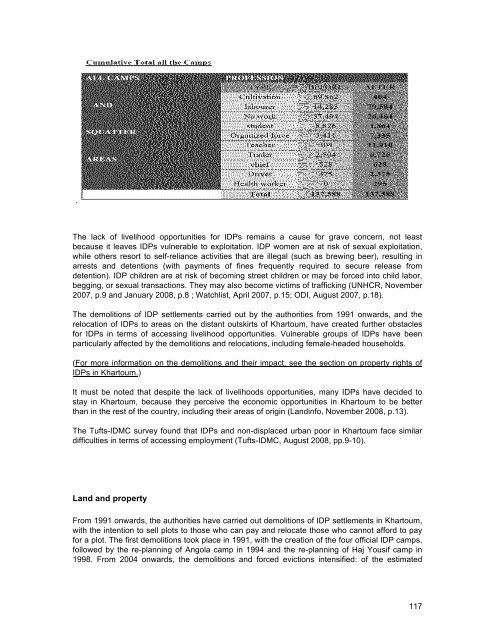SUDAN: Durable solutions elusive as southern IDPs return and ...
SUDAN: Durable solutions elusive as southern IDPs return and ...
SUDAN: Durable solutions elusive as southern IDPs return and ...
Create successful ePaper yourself
Turn your PDF publications into a flip-book with our unique Google optimized e-Paper software.
The lack of livelihood opportunities for <strong>IDPs</strong> remains a cause for grave concern, not le<strong>as</strong>t<br />
because it leaves <strong>IDPs</strong> vulnerable to exploitation. IDP women are at risk of sexual exploitation,<br />
while others resort to self-reliance activities that are illegal (such <strong>as</strong> brewing beer), resulting in<br />
arrests <strong>and</strong> detentions (with payments of fines frequently required to secure rele<strong>as</strong>e from<br />
detention). IDP children are at risk of becoming street children or may be forced into child labor,<br />
begging, or sexual transactions. They may also become victims of trafficking (UNHCR, November<br />
2007, p.9 <strong>and</strong> January 2008, p.8 ; Watchlist, April 2007, p.15; ODI, August 2007, p.18).<br />
The demolitions of IDP settlements carried out by the authorities from 1991 onwards, <strong>and</strong> the<br />
relocation of <strong>IDPs</strong> to are<strong>as</strong> on the distant outskirts of Khartoum, have created further obstacles<br />
for <strong>IDPs</strong> in terms of accessing livelihood opportunities. Vulnerable groups of <strong>IDPs</strong> have been<br />
particularly affected by the demolitions <strong>and</strong> relocations, including female-headed households.<br />
(For more information on the demolitions <strong>and</strong> their impact, see the section on property rights of<br />
<strong>IDPs</strong> in Khartoum.)<br />
It must be noted that despite the lack of livelihoods opportunities, many <strong>IDPs</strong> have decided to<br />
stay in Khartoum, because they perceive the economic opportunities in Khartoum to be better<br />
than in the rest of the country, including their are<strong>as</strong> of origin (L<strong>and</strong>info, November 2008, p.13).<br />
The Tufts-IDMC survey found that <strong>IDPs</strong> <strong>and</strong> non-displaced urban poor in Khartoum face similar<br />
difficulties in terms of accessing employment (Tufts-IDMC, August 2008, pp.9-10).<br />
L<strong>and</strong> <strong>and</strong> property<br />
From 1991 onwards, the authorities have carried out demolitions of IDP settlements in Khartoum,<br />
with the intention to sell plots to those who can pay <strong>and</strong> relocate those who cannot afford to pay<br />
for a plot. The first demolitions took place in 1991, with the creation of the four official IDP camps,<br />
followed by the re-planning of Angola camp in 1994 <strong>and</strong> the re-planning of Haj Yousif camp in<br />
1998. From 2004 onwards, the demolitions <strong>and</strong> forced evictions intensified: of the estimated<br />
117
















